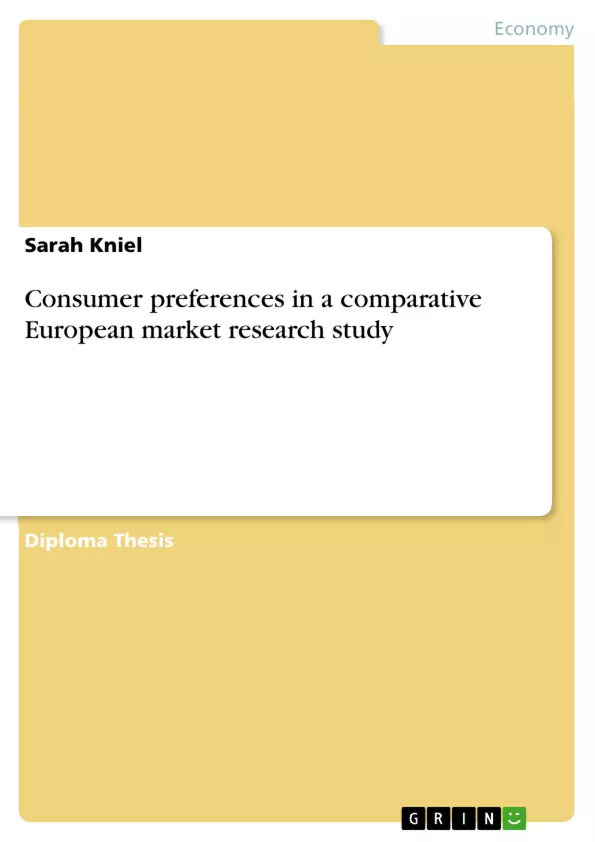Experiencing new and different cultures has been part of my life. The time abroad – more than a third of my life - has led to many interesting personal and professional experiences. This has helped me deal with new and unknown situations and respect tolerance as a most important value. Out of this interest I seek to understand and learn more about different cultures.
Eventually, one realises that differences in cultures might exist but are they really as significant as generally assumed? This question is of great importance for modern economy of these days. In view of the modern world as a global market, the question seems to be – can cultural aspects be ignored? To what extent can and do they influence our thoughts and habits? Bolloré’s market study in cooperation with 6 European universities provided an opportunity to analyse to what extent consumer behaviour is dependant on cultural aspects. Our comparison of European consumer preferences might help to give some attempt to whether we can assume that geographical boundaries are the only factors dividing nations within the European Union.
My research is guided by the very basic question: ‘Even though European countries are linked geographically and politically, and seem to be moving towards a more and more homogeneous union, to what extent can they be considered as one entity?’
Table of Contents
- PREFACE
- INTRODUCTION
- CHAPTER I
- THEORETICAL BACKGROUND: Determinants of consumer behaviour
- An interdisciplinary approach to understanding consumer behaviour
- Strategic options for market segmentation
- Lifestyle approaches
- International market research
- The importance of the ecological factor and food habits
- CHAPTER II
- THE BOLLORÉ STUDY
- Bolloré: the firm
- The international market research project
- Methodical procedure
- Sampling procedure and data collection
- Background data on those countries reanalysed for the Bolloré research study
- The market for plastic packaging
- ICHAPTER III
- A THREE NATION COMPARATIVE RE-EVALUATION OF DATA
- Consumer research theory
- Research approach and research strategy
- Data Analysis
- Methodology
- Evaluation procedure
- CHAPTER IV
- CONSUMER TYPES AND SPECIFIC ATTITUDES & BEHAVIOUR
- Building typologies
- Typologies in relation to consumer behaviour
- Testing consumer groups in the context of further socio-demographic variables
- Distribution of consumer types in the three countries
- Frequency behaviour of consumer types
- Consumer types and choice of purchase location
- Storage location and consumer types
- Marketing aspects for Bolloré
- Consumer types in relation to demands made on packaging
- Specific criteria for packaging
- Conclusion
- CHAPTER V
- IMPLICATIONS AND RECOMMENDATIONS
- Implications for marketing
- Recommendations for further market research studies
- COMMENT
- BIBLIOGRAPHY
- APPENDICES
Objectives and Key Themes
This diploma thesis examines the determinants of consumer behaviour within the context of a comparative European market research study. The research focuses on understanding how consumer preferences and buying habits differ across multiple countries. It aims to identify and analyze key factors influencing consumer behaviour, including demographic variables, lifestyle choices, and the impact of ecological considerations.
- Consumer behaviour in a comparative European market
- Determinants of consumer preferences
- The influence of lifestyle and cultural factors
- The role of ecological considerations in consumer choices
- Implications for marketing and product development
Chapter Summaries
Chapter I provides a theoretical framework for understanding consumer behavior, exploring different approaches to studying consumer preferences and the role of market segmentation in targeting specific consumer groups. Chapter II presents the Bolloré study, a large-scale international market research project, outlining its methodology, data collection, and analysis. Chapter III focuses on a comparative re-evaluation of data from three European nations, examining consumer research theory and the analysis of data to understand consumer preferences across different countries. Chapter IV delves into specific consumer types and their attitudes and behaviors, analyzing how these groups differ in their purchasing decisions and packaging preferences. Chapter V concludes with implications for marketing strategies and recommendations for future market research studies.
Keywords
The primary focus of this diploma thesis lies within the realms of consumer behaviour, international market research, and comparative analysis. The study explores key themes like market segmentation, lifestyle approaches, ecological factors influencing consumer preferences, and consumer typologies. These elements are investigated through the lens of a large-scale European market research project, the Bolloré study, allowing for detailed analysis of data and valuable insights into consumer preferences across different countries.
Frequently Asked Questions
How does culture influence consumer behavior in Europe?
The thesis explores to what extent cultural aspects and geographical boundaries still divide nations within the European Union regarding their thoughts, habits, and preferences.
What is the Bolloré study mentioned in the research?
It is an international market research project conducted in cooperation with six European universities to analyze consumer behavior and preferences across different countries.
What are the main determinants of consumer behavior?
The study identifies lifestyle approaches, demographic variables, food habits, and ecological factors as key drivers of how consumers make choices.
Why is the ecological factor important in modern market research?
Ecological considerations are increasingly influencing food habits and demands made on product packaging, which companies must address to stay competitive.
What are consumer typologies?
Consumer typologies are classifications of buyers into specific groups based on their attitudes and behaviors, helping marketers target their strategies more effectively.
- Quote paper
- Sarah Kniel (Author), 2002, Consumer preferences in a comparative European market research study, Munich, GRIN Verlag, https://www.grin.com/document/14294



